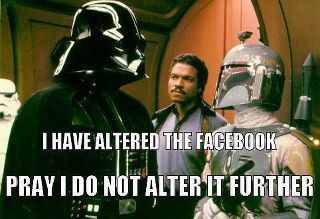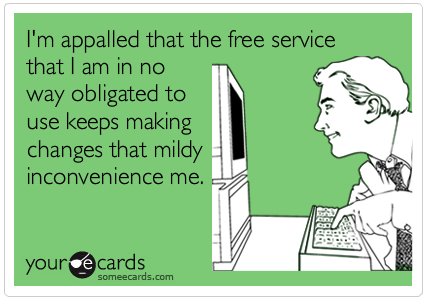 Everyone on the Internet is talking about it today, so why shouldn’t I?
Everyone on the Internet is talking about it today, so why shouldn’t I?
Facebook changed the way the site’s news feeds work today. Now, rather than seeing things in chronological order or order of algorithm-perceived importance, you see a smattering of the news that the site’s algorithm thinks will be important to you mixed in with recent updates and postings from your friends.
Oh, and now you can “subscribe” to other users who you don’t necessarily want to be friends with. It’s a feature designed to bring Facebook more into the realm of Twitter — that is to say, to make Facebook more of a source of news from the wider world rather than just from your own social circle of “friends.”
The other thing that’s new is a little ticker in the right column of your home screen that shows off some of the more mundane things that your friends are doing on Facebook: liking things, becoming friends, recommending things, etc. It constantly updates, like a news scroll at the bottom of CNN.
What do I think about the new Facebook? I don’t mind it. I’m fairly open to change on Facebook and any other website, but I also don’t have any real emotional attachment to the site. Sure, I have friends and family who I communicate with on there, but it’s not a vital communication channel for me. Plus, I’m not nearly as active on there as I used to be. Chalk that up to using it for work so much that I don’t really have time for it at home or care to use it on a non-professional basis.
 But some people are very involved with Facebook. For some of them, it is their only convenient way to keep in touch with their friends — many of whom may not live anywhere close or stay in contact in other ways. As my wife put it, it’s a way for people who may not have a lot of friends they meet with in the real world to run in a social circle.
But some people are very involved with Facebook. For some of them, it is their only convenient way to keep in touch with their friends — many of whom may not live anywhere close or stay in contact in other ways. As my wife put it, it’s a way for people who may not have a lot of friends they meet with in the real world to run in a social circle.
The changes, she noted, make it very hard to do that. No longer can you simply log in to see what has gone on in the hours or days since you last logged in. Now, you have an algorithm telling you what should be important to you. The convenience of simply checking in to see what’s up is gone, making it far more inconvenient for the casual user.
I can understand that. Any sense of order, of control over the way in which you consumer content on Facebook is gone, replaced by the almighty algorithm. That loss of control is disguised as a feature — you no longer need to worry about the order of things, Facebook will worry about it for you. Still, feature though it may be, it’s still a loss of control.
Many people complained about the changes today. Few of them were amused when I suggested in a status update — as I do every time Facebook changes something — that if they don’t like it, they are free to quit. I suppose that, if we really stop to think about it, some people just aren’t free to quit Facebook. It has become a necessary part of how some people communicate with friends. Asking them to quit that would be like asking them to give up their friends.
Related articles
- Facebook changes your page again, picks the news it thinks is important to you (chron.com)
- Facebook Redesigns: A Long History of Pointless Backlashes (pcworld.com)
- Who Moved My Cheese? – Facebook Changes Again (accesscomptech.wordpress.com)
- Facebook spiffs up its news feed, adds real-time activity ticker (venturebeat.com)
- Facebook users: Not even the English(UK) can save you now. (geeksaresexy.net)
- Facebook Changes News Feed to Focus on ‘Top Stories’ (techland.time.com)
- We like it… don’t change it! (comuq.wordpress.com)
- Facebook redesign: Hate the new features? You’ll like them soon enough. (slate.com)
